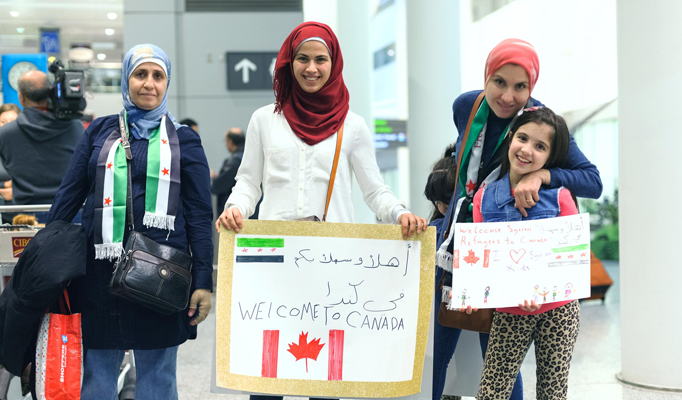
God’s mandate for his people wasn’t an option to be considered. It was a choice to be lived out. “Is not this the kind of fasting I have chosen: to loose the chains of injustice and untie the cords of the yoke, to set the oppressed free and break every yoke? Is it not to share your food with the hungry and to provide the poor wanderer with shelter…?” Isaiah 58:6-7a
Gabriela Ramo, former chair of the immigration section of the Canadian Bar Association noted that President Trump “is talking about deporting 11 million people.” What would it be like to be the person affected by legislation that reproduces trauma you’ve been through before; separates family members for long periods of time; strips you of dignity and the ability to care for and support your family; immerses you into an unknown and not always welcoming culture where you have to navigate systems you can’t understand? And to have to do it alone.
I’ve personally heard the stories of over five hundred refugees and not one of them is the same. New stories are about to be written. Executive orders have been signed now. Birthright citizenship for those born in the U.S. from parents who are there illegally or temporarily is gone. Border security has been tightened. The U.S. refugee assistance program has been suspended, and charities are struggling. The expectation is that many will come north and claim asylum. There is a complication. The Safe Third Country Agreement between Canada and the U.S. means that those who don’t have American citizenship, or who are undocumented, may be turned back at the border if they try to cross at a regular border crossing. Slipping across the border undetected, and then hiding for 14 days so they can claim asylum without being returned, seems to be the only option left. The new agreement to beef up the border to avoid tariffs has been designed to put a choke hold on that option.
The Refugee Claimant Housing Coalition (RCHC) of BC has been formed to provide these newcomers with housing solutions through “reception, transitional, and permanent housing.” In a country already choking on homelessness, the strain on non-profits is strong. The RCHC is building on “over 25 years of dedicated work by faith-based groups, charities, coalitions, three levels of government, and others” in BC to address the need. The RCHC research indicates that “7,700 refugee claimants arrived in BC in 2023 compared to 535 in 2013 and 10,115 arrived” in the first 11 months of 2024. This is about six percent of refugees entering Canada. Fifty five of these refugee claimants were included in the 2023 Homeless count. The Refugee Claimant Housing Referral and Data Management System (now renamed CHARMS) shows that 131 out of 249 households (52%) and 392 out of 630 individuals (62%) were successfully placed into housing by settlement agencies and transitional housing providers. Refugee families are facing costs in the Vancouver area of three-bedroom apartments at $4418 a month at a time when the vacancy rate is below 2%.
Something more is at stake. Diana Gallego, President of the Canadian Council for Refugees states, regarding the October 2024 decision of the government that: “Behind the numbers slashed from the humanitarian component of the levels today are over 14,000 real people fleeing persecution and seeking safety in Canada or struggling in conflict zones around the world facing violence, starvation, and death. It particularly fails those already here whom we have committed to protect, and their family members abroad…It is not an exaggeration to say that the action taken today will rob children of their futures and destroy families. People will lose their lives.”
But what about our fear? Can perfect love for our neighbour cast out the fear of being overwhelmed, assaulted, taken advantage of? Only if we step out of our comfort zones to build relationship. Fear has, so often, to do with the unknown. Julia Beazley, director of the Evangelical Fellowship of Canada’s Centre for Faith and Public Life in Ottawa says “God is compassionate…As we think about how to move through our world, caring for our neighbours who are vulnerable is central to our calling…We were created to help one another. Each person’s life is precious. Each one is made by God and loved by him…Vulnerability is part of being human and each of us is likely to experience vulnerability at some point or at several points during our lives.”
RCHC member organizations say “The need is clear. There are more refugee claimants arriving and in need of dignified, humane, housing solutions than resources currently allow. The non-profit sector is not adequately resourced to meet these needs.” Housing traumatized newcomers with those struggling from addiction or mental illness is not a solution that works and filling up half of available shelter space with asylum seekers is not tenable as a help to resolve the need for housing for vulnerable Canadians.
The conclusion: “It is time for provinces to establish and fund dedicated welcome centre(s) with emergency shelter beds, food security support, and wrap-around care including timely and focused referrals to existing resources.” Can the rest of us pray? Find open doors? Volunteer? Be a friend?
What are your thoughts? Julia Beazley challenges with these three questions: “Can you think of someone you know who lives with vulnerabilities? What questions can you ask them so you can listen and learn about what partnership and support you could offer during this season in their life? What fears and concerns do you have about stepping more fully into the calling to love our neighbours in these practical and spiritual ways?”

Leave a Reply